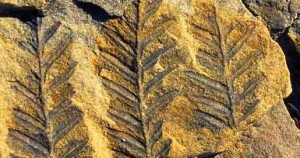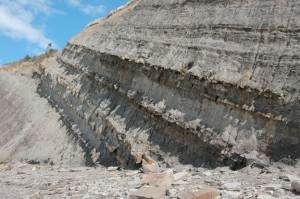 As you comb the beaches at low tide, discover many treasures revealed and left behind by the Fundy’s great tides, including fascinating fossils. The most popular location along this coast for fossils is unarguably the Joggins Fossil Cliffs in Joggins, Nova Scotia.
As you comb the beaches at low tide, discover many treasures revealed and left behind by the Fundy’s great tides, including fascinating fossils. The most popular location along this coast for fossils is unarguably the Joggins Fossil Cliffs in Joggins, Nova Scotia.
Located at the head of the Bay of Fundy, these 75-foot high cliffs are exposed to constant tidal action and as Fundy’s 50-foot tides erode the cliffs, new fossils are revealed including a rich variety of flora, diverse amphibian fauna, important trackways and some of the world’s first reptiles.
 The Joggins Fossil Cliffs became famous in 1852 when Sir Charles Lyell and Sir William Dawson discovered fossilized tree trunks found in their original positions. When closer examined, tiny bones were noticed within these trunks that turned out to be one of the most important fossil discoveries in Nova Scotia. These remains were from one of the world’s first reptiles and evidence that land animals had lived during the Coal Age 300 million years ago.
The Joggins Fossil Cliffs became famous in 1852 when Sir Charles Lyell and Sir William Dawson discovered fossilized tree trunks found in their original positions. When closer examined, tiny bones were noticed within these trunks that turned out to be one of the most important fossil discoveries in Nova Scotia. These remains were from one of the world’s first reptiles and evidence that land animals had lived during the Coal Age 300 million years ago.
A UNESCO World Heritage Site since 2008, the Joggins Fossil Cliffs truly are a world-class palaeontological site. Not only do the Cliffs showcase the most complete fossil record of life during the Coal Age, but Joggins is the only place in the world where people can view these rare plant and animal fossils preserved in the same place they once thrived (Joggins Fossil Institute, 2011).

In addition to viewing the Cliffs themselves, visitors can explore the Joggins Fossil Centre to learn more about the geological history of the Cliffs as well as the history of scientific discoveries at Joggins and that of coal mining in the region and how it shaped the local communities.
This article is part of our “52 Reasons” series. So check out the next reason: Beautiful Bay of Fundy Gardens, or last week’s reason: Maritime Hospitality. We also think you may want to take a look at the overview of all the articles in this series and use our RSS feed so you won’t miss any further articles!